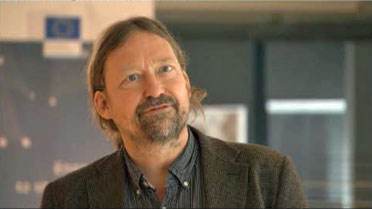The ESRC STEPS Centre’s Co-Director Professor Andy Stirling recently gave a keynote speech at the European Commission’s ‘FTA 2014: future oriented technology analysis’ conference. Prof. Stirling’s address, From Knowledge Economy to Innovation Democracy: collective action in the shaping of scientific and technological futures, was based on his extensive work on technocratic transitions and opening up pathways to social, technological and environmental sustainability. A video of the address, the presentation slides, an interview and related reading are included below.
Worldwide, current technology policy in the ‘knowledge economy’ of the European ‘Innovation Union’ tends to treat developments in each domain as a one-track ‘race to the future’. Pressures for political justification tend to lead attention to fixate around those research trajectories or technological pathways most strongly promoted by incumbent interests.
Questions are typically limited to: “yes or no?”, “how fast?”, “who’s ahead?”in the favoured trajectory – often accompanied by anxious warnings over consequences of “falling behind”. Despite efforts to eschew underlying ‘linear models’, these perennial political pressures can often prove insuperable for future oriented technological analysis (FTA). Yet what is striking about such prevalent notions, is that they entirely misconceive the diversity of well-established understandings of innovation underpinning all forms of FTA.
Here, scientific research and technological development are recognised rather as branching evolutionary processes involving not just technical optimisation, but collective exploration and social choice. Although understandable in political terms, these blinkers are unfortunate. Crucial underlying issues can thereby easily become neglected – around: ‘which way?’, ‘what alternatives?’, ‘who says?’ and ‘why?’
Even many participatory exercises in FTA are consequently often framed more around issues of the risk or acceptability of some particular favoured technologically-intensive pathway, rather than broader and more symmetrical attention to the full range of social innovations potentially addressing the same societal ends. So, despite best efforts, policy debates addressed by FTA often become highly polarised as ‘for or against’ particular technologies like GM, nuclear power, pharmaceuticals or agrochemicals. Very specific criticisms can become branded as generally ‘anti science’. And, although recognised as a crucial quality control principle in science, scepticism tends to be treated as a pathology when it is manifest in wider society.
As a result, the forces that drive the directions for innovation can thereby remain seriously under-scrutinised – around powerful interests, privileged markets, intellectual property, industrial concentration and military strategies. Likewise, space for contention often further attenuates in regulatory debates. These typically allow room only for limited interrogation of ‘risk’ – excluding intractable forms of uncertainty and ambiguity. Anticipating this, ‘upstream’ policy and academic analysis alike disproportionately revolve around under-specified notions of ‘responsibility’ and ‘engagement’, also framed in these terms.
Again, political pressures on the conduct of FTA typically assert the supposedly self-evident desirability of efficiency, stability, consensus, trust and acceptance. Also suppressed in this prevailing policy discourse of social control, are the crucial historical roles played by collective action by civil society and social movements. As shown by ongoing emancipations of workers, colonies, women and oppressed ethnicities and sexualities – it is civil society (not science or the market) that principally drives the normative frameworks and political gradients that define what is meant by ‘progress’ in the first place.
Without such pressures, for instance, there would be high-level policy structures for articulating notions of ‘sustainability’ or ‘development’, that currently offer such important ways to gauge the appropriate orientations for progress. Also thereby obscured, is another historical fact: that many of the most progressive innovations themselves (like wind power, green chemistry, community ownership), also owe more to unruly collective action, than orderly social control.
So: innovation policy needs to be more explicitly recognised on all political sides, as a key arena for democratic struggle and social choice. Accordingly, this presentation outlined indicatively, a range of principles and tools by means of which the institutions and practices of FTA might enable greater transparency, accountability and legitimacy in the unfolding of innovation.
In a world where social, environmental and development agendas are arguably becoming increasingly scientistic and technocratic: a way is offered to reconcile the apparently unduly sundered domains of science and democracy. Indeed, it may be that hopes for reinvigorating democracy in its stagnating heartlands, may rest on success in ambitious extension – on building innovation democracy.
Resources
Watch a short interview with Prof. Stirling on this topic
Watch Prof. Stirling’s keynote address
View the slides of this keynote address
Relevant reading
-
- Towards innovation Democracy? Participation, Responsibility and Precaution in Innovation Governance, STEPS Working Paper 78 by Andy Stirling
- Emancipating Transformations: From controlling ‘the transition’ to culturing plural radical progress STEPS Working Paper 64 by Andy Stirling
- The Politics of Green Transformations, edited by Ian Scoones, Melissa Leach and Peter Newell
